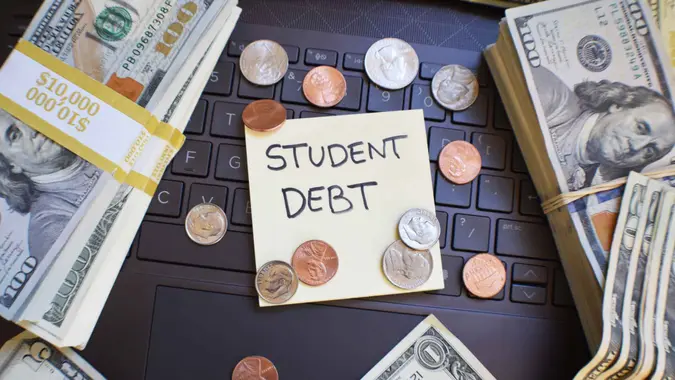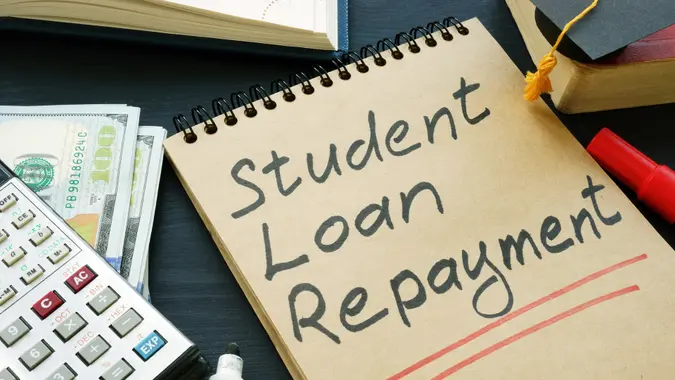Student Loan Scams Rise as Forgiveness Wanes — 6 Ways To Verify Legitimacy

Commitment to Our Readers
GOBankingRates' editorial team is committed to bringing you unbiased reviews and information. We use data-driven methodologies to evaluate financial products and services - our reviews and ratings are not influenced by advertisers. You can read more about our editorial guidelines and our products and services review methodology.

20 Years
Helping You Live Richer

Reviewed
by Experts

Trusted by
Millions of Readers
When it comes to navigating federal student loan payments, to say it’s a confusing environment is an understatement. With so many recent changes circulating in the federal student loan space, including the pausing of many forgiveness programs, and sophisticated fraudsters, it’s easier than ever to fall for a scam.
Explore how to protect yourself from common student loan scams today.
Why Are Student Loan Forgiveness Scams on the Rise?
According to the U.S. Department of Education, 42.7 million borrowers hold more than $1.6 trillion in student loan debt. And millions of borrowers are behind on their federal student loan payments.
With so many people struggling to keep up with their student loan payments and forgiveness options in limbo, it’s not too surprising that many are looking for forgiveness opportunities anywhere they can find them. According to CNET, these types of scams become more common during times of policy changes and confusion, and scams promising student loan forgiveness are rising.
Fraudsters are filling the gap by offering student loan borrowers a forgiveness option. But after paying an upfront fee or handing over banking information, the scammer disappears with their money.
How To Verify a Student Loan Forgiveness Scam
As student loan forgiveness scams become more common, it’s helpful to get familiar with their hallmarks and how to avoid them. Here are some of the common features of a scam.
Upfront Fees
When someone calls you up to offer student loan forgiveness, it’s tempting to jump in. But if there’s an upfront fee involved, that’s a red flag. Generally, scammers take the fee and walk away without doing anything for you.
Information Requests
If someone who reached out to you starts to ask for personal or financial information, it’s time to hang up.
Common requests might include your address, passwords, banking details or credit card information. Scammers could even ask for your StudentAid.gov account information.
When you feel peppered with too many prying questions, it’s likely you have a scammer on your hands.
Pressing Deadlines
Fraudsters like to put pressure on victims by imposing an artificial deadline. For example, they might claim that you must act today or lose the opportunity forever.
Although the student loan repayment programs are undergoing changes, it’s important to dig out this information and any deadlines from your student loan servicer or the Department of Education’s website. If you begin acting on information that you haven’t confirmed through a reliable source, you might fall into a scammer’s trap.
Unrealistic Promises
When you are dealing with student loans, the ability to pay them off or enjoy forgiveness in one call sounds like a dream come true. While a scammer may offer that opportunity, when something sounds too good to be true, it usually is.
For example, if you are promised student loan cancellation for a one-time fee, that’s likely a scam.
Typos
Blatant typos and grammatical errors sprinkled throughout your communication with a so-called servicer signal a red flag. If you spot anything that looks questionable, double-check the legitimacy of the company.
A quick online search might reveal a scam in the making.
Unofficial Forms of Contact
If you are receiving communication from random numbers that don’t connect to your student loan servicer, it’s generally a scam. When you receive an offer you are interested in, reach out to your student loan servicer directly for more information.
After reaching out through proper channels, you’ll find out whether or not an offer is legitimate.
Takeaway: Do Your Due Diligence
Student loan scams are on the rise. Although fraudsters are getting more sophisticated, doing your due diligence on any potential forgiveness opportunities usually exposes a fraud.
Ignoring the unsolicited offers is one option. Another is to contact your student loan servicer to find out whether it’s truly an option for you.
 Written by
Written by  Edited by
Edited by 
























